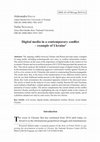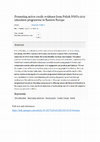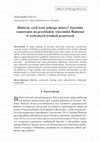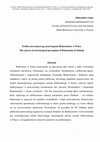Papers by Aleksandra Monkos

Central European Journal of Communication, 2020
The paper offers an analysis of media assistance, as a specific form of foreign aid, that Poland ... more The paper offers an analysis of media assistance, as a specific form of foreign aid, that Poland offers to strengthen media development in Belarus and Ukraine. It shows if Poland tailors media assistance according to the local context and existing challenges for democratic changes of recipient countries' media systems. The study builds on the literature concerning the media, development and democratization, in particular looking at media assistance as both democratic aid and public diplomacy. It reveals that Poland's approaches to media development in Belarus and Ukraine do differ: Poland mainly provides autocratic Belarus with technical support for media established outside of that country, while clearly focusing on media capacity development in democratizing Ukraine. The findings show that Polish media assistance, however, is unlikely to boost media freedom in Belarus as is usually expected as an outcome of democratic aid and is under-financed in the case of Ukraine.

Środkowoeuropejskie Studia Polityczne, 2019
The ongoing conflict between Ukraine and Russia provides many examples of using media, including ... more The ongoing conflict between Ukraine and Russia provides many examples of using media, including technologically new ones, to conduct information warfare. The article focuses on the issue of the importance of digital media in the context of war in eastern Ukraine and socio-political protests (2013/2014) that preceded the armed conflict. This article analyzes the methods of instrumental usage of digital media by Russia as the dominant entity in conducting aggressive information warfare against Ukraine as well as civic actions on the Ukrainian side aimed at counteracting Russian propaganda. The results show that, in the times of the mediatization of war, different entities tend to actively use both traditional media present in the digital space and social media. In addition, this work systematizes the conceptual apparatus related to the discussed issues. The article is based on the analysis of case studies (mainly Russian RT and Ukrainian, social initiative StopFake), content analysis, analysis and criticism of literature, and examination of source studies. The article complements the current debate on the conflict between Ukraine and Russia by highlighting the role of digital media in the context of information warfare and by showing that digital media, especially social media, can be a platform adopted not only by state actors, but also for citizens.
e-Politikon, 2019
Wspieranie demokracji (democracy assistance) obejmuje działania donatorów, które mają przyczynić ... more Wspieranie demokracji (democracy assistance) obejmuje działania donatorów, które mają przyczynić się do dobudowania społeczeństwa obywatelskiego, demokratycznych instytucji państwowych, niezależnych mediów itd., a także wspierać dialog obywatelski w państwie partnerskim. Celem artykułu jest analiza wsparcia medialnego (media assistance) jako elementu polskiej pomocy demokratyzacyjnej kierowanej na Ukrainę w latach 2004-2018. Problem badawczy koncentruje się na ustaleniu poziomu spójności założeń programowych polskiej Oficjalnej Pomocy Rozwojowej (ODA) z realizowanymi projektami medialnymi.

Journal of International Relations and Development, 2020
(FULL TEXT: https://rdcu.be/PqHA)
Civic education, i.e. activities aimed to teach citizens of ... more (FULL TEXT: https://rdcu.be/PqHA)
Civic education, i.e. activities aimed to teach citizens of recipient countries basic values, knowledge, and skills relating to democracy, has become a popular form of promoting democracy by NGOs from Poland, the Czech Republic, Slovakia, and Hungary. This paper examines whether democracy promotion programmes, such as civic education, implemented by NGOs from Central and Eastern European countries towards young people in former post-communist countries affect participants’ civic engagement and political participation. We test the impact of one of the civic education programmes on young people from Belarus, Moldova, Ukraine, and the Russian Federation. The analysis of the programme and the results of the survey conducted among the civic education programme’s former participants from 2004 to 2014 contribute to a better understanding how youth participation can be built through mechanism of knowledge created by outside actors. The paper reveals some potential of programmes focused on educating young people in diffusing democratic ideas and behaviour in the region; however, it also shows the limitations of methodology used to evaluate the impact of democracy promotion efforts.

Środkowoeuropejskie Studia Polityczne, 2017
After the relatively successful system transformation, some young democratic countries from Cent... more After the relatively successful system transformation, some young democratic countries from Central and Eastern Europe which used to receive democratic aid in the 1980s and 90s have engaged as new donors in assisting pro-democratic changes in other post-communist countries. The donor-recipient relations between two post-communist countries can be observed on the example of the development of cooperation between Poland and Ukraine. This paper deals with Polish assistance to new media in Ukraine in from 2007-2017 as a part of supporting democracy in Ukraine under the Polish Cooperation Development Program. Firstly, this work examines whether the Polish government's support of Ukrainian media as part of cooperation development will be sustained regardless of changes in the Polish government. Secondly, the paper explores whether Polish NGOs tailor their projects, financed by the Polish MFA, to the recipients' respective needs and the current situation in Ukraine. By examining Polish media assistance, the authors aim to explain the efforts of the new donor in developing media in a partner country, emphasizing the relation between the involvement of external actors and the presence of independent media which play an important role in democratization processes.

Środkowoeuropejskie Studia Polityczne , 2015
W ciągu ostatnich lat zjawisku ramowania (framingu) wielokrotnie zwracało uwagę wielu badaczy z p... more W ciągu ostatnich lat zjawisku ramowania (framingu) wielokrotnie zwracało uwagę wielu badaczy z pogranicza nauk o mediach i nauk o polityce. Medialna reprezentacja poszczególnych problemów może mieć wpływ na ich społeczny odbiór. Celem artykułu jest analiza wizerunku Białorusi konstruowanego przez dziennikarzy najpopularniejszych tygodników opiniotwórczych w Polsce. Autorka stawia sobie za zadanie sprawdzenie czy Białoruś portretowana jest w oparciu o pewne utarte schematy – niedemokratyczne rządy prezydenta Aleksandra Łukaszenki, łamanie praw człowieka oraz marazm społeczeństwa białoruskiego. Nastawienie na informacje negatywne i jednowymiarowy opis potencjalnie mogą mieć wpływ na polską opinię publiczną. Z tego względu warto precyzyjnie wyróżnić powtarzające się ramy interpretacyjne, co z kolei przyczynić się może do lepszego zrozumienia zjawiska framingu, czyli ramowania wydarzeń w środkach masowego przekazu.

Belarusians in Poland are seen mostly as a nation with a poorly developed national identity with ... more Belarusians in Poland are seen mostly as a nation with a poorly developed national identity with ‘eastern’ mentality and political apathy. The image of Belarus and Belarusians in Polish media is negative and one-dimensional which has strong effects on Poles and perpetuates the stereotypes. The sources of stereotypical perception of Belarusian people might be found in well-functioning in polish mentality myth of ‘Eastern Borderlands’ as well as in associations with ‘homo sovieticus’. Not without significance are polish autostereotypes that influence defining the national identity of Poles which was under construction in opposition to Eastern nations and Orthodox religion for centuries. Historically rooted prejudices are visible in the area of the Polish language which can also has its influence on social reality. Polish public opinion surveys, carried out since early 90s’, confirm mentioned, negative attitude of Poles. This article aims to systematize the sources of stereotypical perception of Belarusians in Poland – covering different aspects of this phenomen.
Book chapters by Aleksandra Monkos
Rostyslav Romaniuk, Aleksandra Kordońska, Roman Kordoński (red.), Modern Geopolitics as a Challenge for International Security. Scientific Materials of the International Scientific-Practical Conference (February 10, 2018), Lviv, Ivan Franko National University of Lviv, pp. 79-82., 2018
An abstract published in conference materials.
Aleksandra Kordońska, Roman Kordoński (red.), Współczesna geopolityka – wyzwanie dla bezpieczeństwa międzynarodowego, Lwów-Olsztyn, Lwowski Uniwersytet Narodowy im. Iwana Franki, s. 49-60., 2018
Celem artykułu jest uporządkowanie rozważań naukowych na temat pomocy zagranicznej, rozumianej ja... more Celem artykułu jest uporządkowanie rozważań naukowych na temat pomocy zagranicznej, rozumianej jako zaangażowanie donatorów we wspieranie rozwoju ekonomiczno-społecznego na świecie. W ramach niniejszej pracy wskazane zostaną rozróżnienia terminologiczne oraz omówione dwa wymiary międzynarodowego wsparcia dla rozwoju: publiczny i prywatny. Artykuł zasygnalizuje także główne problemy, z którymi współcześnie mierzyć się muszą aktorzy udzielający pomocy zagranicznej, takie jak kwestia efektywności wsparcia oraz jego selektywnej alokacji w państwach rozwijających się.
Book reviews by Aleksandra Monkos
Recenzja została opublikowana w czasopiśmie Środkowoeuropejskie Studia Polityczne, nr 2/2014.











Uploads
Papers by Aleksandra Monkos
Civic education, i.e. activities aimed to teach citizens of recipient countries basic values, knowledge, and skills relating to democracy, has become a popular form of promoting democracy by NGOs from Poland, the Czech Republic, Slovakia, and Hungary. This paper examines whether democracy promotion programmes, such as civic education, implemented by NGOs from Central and Eastern European countries towards young people in former post-communist countries affect participants’ civic engagement and political participation. We test the impact of one of the civic education programmes on young people from Belarus, Moldova, Ukraine, and the Russian Federation. The analysis of the programme and the results of the survey conducted among the civic education programme’s former participants from 2004 to 2014 contribute to a better understanding how youth participation can be built through mechanism of knowledge created by outside actors. The paper reveals some potential of programmes focused on educating young people in diffusing democratic ideas and behaviour in the region; however, it also shows the limitations of methodology used to evaluate the impact of democracy promotion efforts.
Book chapters by Aleksandra Monkos
Book reviews by Aleksandra Monkos
Civic education, i.e. activities aimed to teach citizens of recipient countries basic values, knowledge, and skills relating to democracy, has become a popular form of promoting democracy by NGOs from Poland, the Czech Republic, Slovakia, and Hungary. This paper examines whether democracy promotion programmes, such as civic education, implemented by NGOs from Central and Eastern European countries towards young people in former post-communist countries affect participants’ civic engagement and political participation. We test the impact of one of the civic education programmes on young people from Belarus, Moldova, Ukraine, and the Russian Federation. The analysis of the programme and the results of the survey conducted among the civic education programme’s former participants from 2004 to 2014 contribute to a better understanding how youth participation can be built through mechanism of knowledge created by outside actors. The paper reveals some potential of programmes focused on educating young people in diffusing democratic ideas and behaviour in the region; however, it also shows the limitations of methodology used to evaluate the impact of democracy promotion efforts.